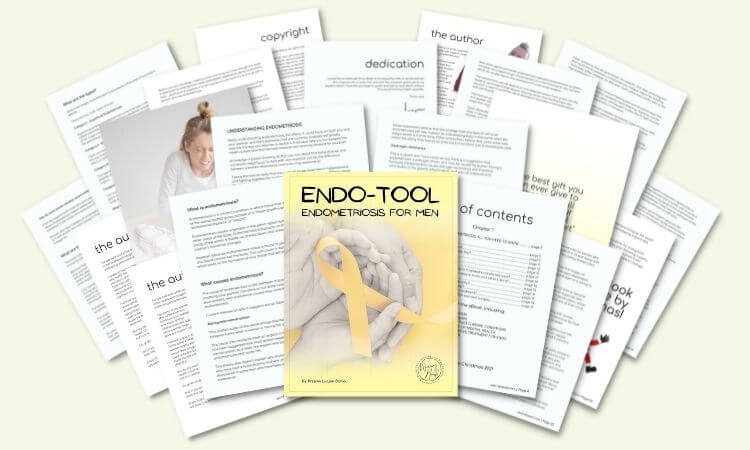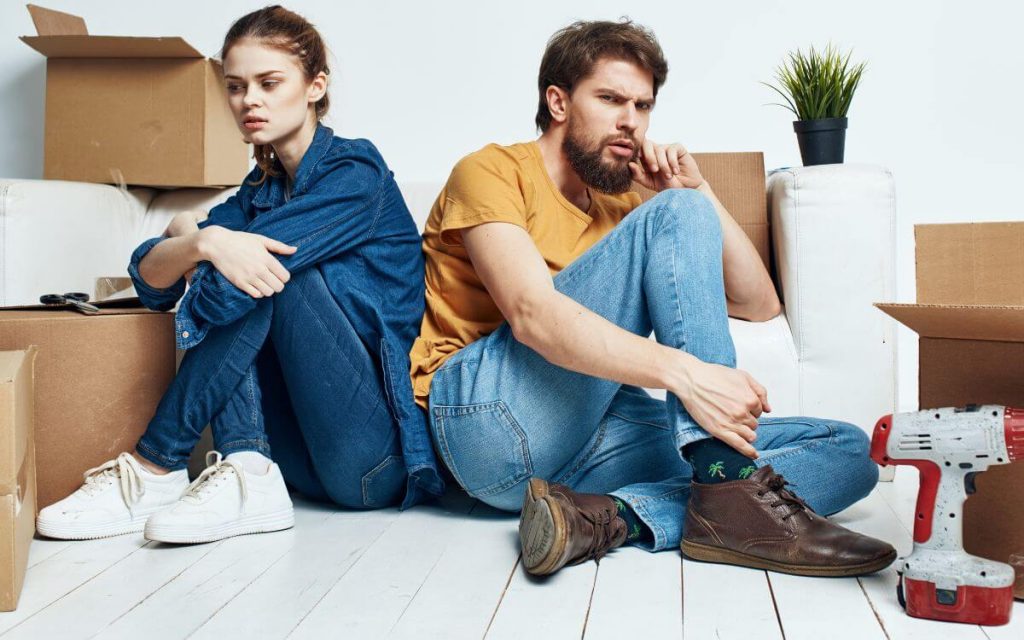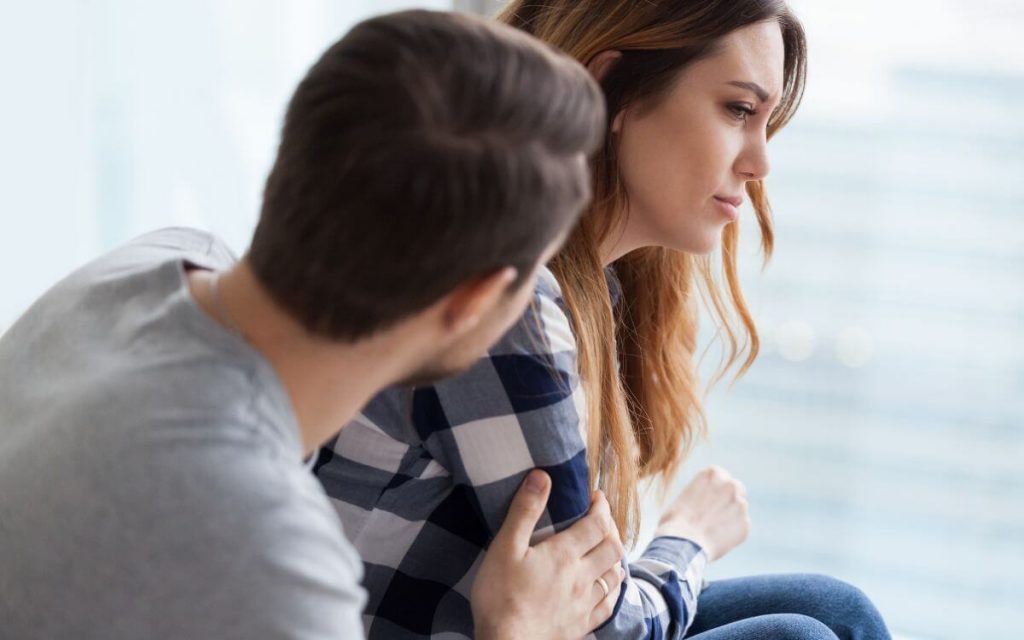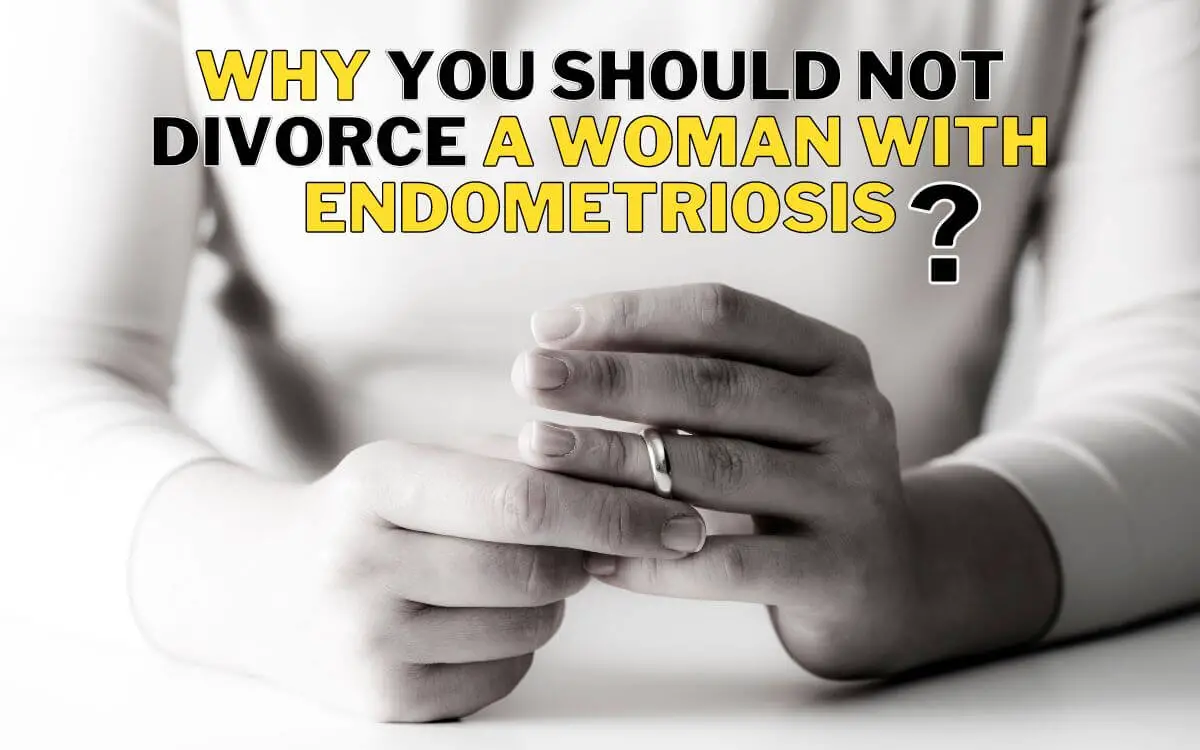Why should you not divorce a woman with endometriosis?
Divorcing a woman with endometriosis is not the answer. I know this because even though being a husband to a woman with endometriosis can be challenging, it is important to understand and support her. Endometriosis is a painful medical condition that affects many women, and male partners can play an important role in helping to manage the condition.
By showing patience and understanding, husbands can help to reduce the physical and emotional burden of endometriosis on their wives as it negatively impact women’s quality of life.
Divorcing a woman with endometriosis is not the answer. Instead, men should be there to provide support and create a safe space for her to express her feelings by listening to her concerns, understanding her triggers, and being compassionate.
- Endometriosis.
- The endometriosis divorce rate.
- Forgotten caregivers.
- Society is wrong!
- My personal 13 endometriosis tips!
- 1. Be patient.
- 2. Listen openly and without judgment.
- 3. Ask honest questions.
- 4. Research the condition together.
- 5. Encourage her to find additional support when needed.
- 6. Participate in her treatment plan when appropriate.
- 7. Take care of yourself too.
- 8. Show compassion for her experience.
- 9. Offer practical help when needed.
- 10. Educate yourself on her triggers and warning signs.
- 11. Respect her decisions when it comes to treatment plans and lifestyle changes.
- 12. Be there to celebrate her successes.
- 13. Don't take things personally if she gets mad or frustrated.
- Quick wrap-up.
Endometriosis.
If you know a thing or two about this diabolic chronic condition you can skip this section and go down to the endometriosis divorce rate part, but if you are new to this, you need to get to know the basics, including:
- What is endometriosis?
- The early signs.
- How is it diagnosed?
- What is the treatment?
- How to manage it at home?
What is endometriosis?
It is a medical condition in which tissue that is similar to the one line of the uterus (endometrium) grows outside of the uterus, usually on the ovaries, fallopian tubes, and sometimes even on other organs like the bladder or intestines.
This tissue can cause inflammation, excruciating pain, and in some cases even infertility due to the scarring of the organs. The negative impact of endometriosis on women’s quality of life is vast.
It is important for husbands to have to understand the impact of endometriosis on their wives. This is where the need for education for men about this chronic illness is vital!
If you want to learn more about endometriosis, I wrote an “Endo-Tool, Endometriosis for Men” e-Book.
You can get the 1st Chapter of the e-Book for FREE, and if you like it, you’ll get a Whopping 33% Discount on the Whole Book, plus discounts on other helpful tools. You have nothing to lose but a lot to gain!
The first chapter alone contains all the comprehensive medical knowledge about endometriosis, including:
- What is endometriosis?
- What are the symptoms?
- What causes endometriosis?
- What does endometriosis look like?
- What are the stages?
- What are the types?
- What is adenomyosis and how is it related to endometriosis?
- Why do some women develop severe endo and others don’t?
- Does endometriosis cause infertility?
- How is endometriosis diagnosed?
- Do types and stages affect the treatment?
- Recurrence of endometriosis after excision surgery.
FREE Chapter of “Endo-Tool”
Endometriosis e-Book for Men

The early signs.
It may seem impossible to recognize endometriosis if you don’t know what to look for.
The early signs may include pain during periods, pain with intercourse, reduced sexual desire, chronic pelvic pain or discomfort, excessive bleeding or spotting between cycles, and painful urination amongst other issues.
The symptoms may vary depending on the type and stage of endometriosis. They may include the following:
- Type I – Minimal endometriosis: none to mild pelvic pain
- Type II – Mild endometriosis: moderate to severe pelvic pain and heavier menstrual bleeding
- Type III – Moderate endometriosis: very severe pelvic pain, very heavy menstrual bleeding
- Type IV – Severe endometriosis: extreme pelvic pain, infertility, and other organ involvement
- Category I – Peritoneal endometriosis: lesions are found on the surface of pelvic organs
- Category II – Ovarian endometriomas (chocolate cysts): lesions are also found on the surface of pelvic organs
- Category III – Deep infiltrating endometriosis I: lesions are found deep in the lining of the pelvic organs
- Category IV – Deep infiltrating endometriosis II: lesions are found deep within the pelvic organs, including the bladder, and intestines, and can even affect various nerve endings.
It’s important to understand the types and stages of endometriosis, as well as its symptoms to be better equipped to support your partner and help her manage the condition.
How is it diagnosed?
Endometriosis can be diagnosed with a physical exam, imaging tests like ultrasounds, magnetic resonance imaging (MRI), and surgery with biopsy.
The surgery is called “laparoscopy” in which the doctor uses a thin tube with an attached camera to examine the organs and take tissue samples for further investigation. Surgery is the only way to definitively diagnose this chronic condition.
What is the treatment?
My wife asked herself many times what is the most effective treatment for this chronic illness, but no clinical psychologist, nor healthcare practitioners could ever suggest her something that could help really help.
Many healthcare practitioners aren’t educated enough about this disease, they offer every single person the same systematic treatment, instead of treating every person as an individual.
Doctors shouldn’t treat endometriosis but a person because women are different and have different circumstances. Some women want children, others don’t. Often times surgical options depend on wanting to have children or not.
Treatment depends on the type, stage, and severity of endometriosis and can include hormones, pain medication, or/and even surgery. Surgery may involve the removal of endometrial implants or the destruction of them with heat or lasers, although excision is always the best option.
There are a few types of surgery for endometriosis: laparoscopy, laparotomy, and hysterectomy.
- Laparoscopy is used to remove endometrial implants.
- Laparotomy is used to remove larger endometrial implants or cysts.
- Hysterectomy is the complete removal of the uterus and ovaries, and it is usually only recommended for extreme cases of endometriosis.
How to manage endometriosis at home?
Aside from conventional medical treatment, a holistic approach can help to manage the symptoms. This holistic approach may include lifestyle modifications such as diet changes, stress reduction techniques, and exercise.
The working lives of women are often affected which causes a psychological impact, an emotional impact, an impact on social life, and on trying to get pregnant in order to have children.
Not being able to get pregnant and have children is just one impact of endometriosis on life with this condition according to women’s accounts.
Because of the low sexual function of women affected by this disease, it has a negative effect on men’s emotions, and their low mood, and knowing that their wives can have fertility problems and a lower chance of having children, men struggle to stay.
The impact endometriosis has on men who cannot cope with their wives’ general fatigue and constant pain, makes them feel helpless, especially when they want children.
My wife had in her darkest days two suicidal attempts because of the impact of endometriosis on her. That affected me dearly, but when I began to support her the impact of endometriosis lowered a little because she knew she could rely on me.
It is important for a husband to be supportive of his wife in managing endo. It is also very important to talk about this condition with him so he can better understand your needs and how he can best support you.
Men should also be open to discussing the condition with their female partners, providing emotional support, and assisting in finding ways to reduce stress. By having men educated on this chronic illness, they can better help to manage this chronic condition. This support is important for women in order to live healthy and fulfilling life.

The endometriosis divorce rate.
The endometriosis divorce rate amongst married couples is as high as 75%. For that reason, couples should be aware that endometriosis can have a significant impact on the day-to-day life of marriage.
The endometriosis divorce rate may be high due to a number of factors.
It can make it difficult for women to manage their pain, mood swings, and other symptoms which can lead to tension in the relationship. Equally, partners of women with endometriosis may feel ill-equipped to handle their emotions, their partner’s physical needs, and additional tasks they are not used to performing.
Either way, it can lead to tension as husbands struggle to understand endometriosis and support their wives. It is therefore important that they take time to understand this chronic condition and how it affects their wives.
Couples must be aware that endometriosis is a medical condition that can affect both of them, and both should make sure to communicate their feelings, needs, and expectations in order to maintain a strong relationship.
If one of them doesn’t get involved in the process, it can lead to a strain on the relationship that eventually leads to separation or divorce.
Forgotten caregivers.
Leaving the marriage aside for the moment let’s look at another topic – caretaker relationships and the illnesses’ significant impact on caregivers.
We, men, care for our beloved women. Many women are provided with a lot of information about their condition, and that is a fact, but what nobody is talking about is their partners. They are often forgotten and not included in the endometriosis support system, making it difficult for them to understand and support their female partners fully.
Women’s working lives are affected, but it’s not always possible for men to quit their jobs to support their partners fully. Various websites focus mostly on women’s stories, but men do not voice their voices in these areas. Surely women are affected by pain and other conditions as well.
I am not trying to compete here or take away the physical, emotional, and mental pain of women who suffer from this chronic condition. I understand that when endometriosis flare-ups come and severe pain hits, it becomes unbearable and unavoidable.
This becomes an emotional time. It looks like everything goes as expected, but you aren’t relaxing at home at the moment. One bad act can cause pain that could last days.
Having a nice romantic dinner can cause pain and inconvenience. Uncertain events like this make women frustrated & irritable, however, nobody talks about men whose lives have been lost too.
Because of the pain during physical intimacy, understandably, women try to satisfy their partners despite the pain, but there are limits to what their bodies and minds can take. This is when men often escape to having affairs.
Marriages often fall apart because endometriosis often affects sexual life and increases infertility risk in couples. This is one other reason why a high divorce rate is associated with endometriosis. Several factors cause anxiety and grief about pending events.
But husbands aren’t naturally equipped to become spousal caregivers, and that can also lead to missed warning signs and an increased risk of male depression.
Society is wrong!
There is more to male partners and endometriosis than meets the eye. I’m a man, and I know first-hand the difficulty of supporting a female with endometriosis.
The biggest problem most men like me face is society’s expectation that men should be strong and stoic, even in the eyes of the medical community. This can make it difficult for us to talk about our own struggles with supporting a woman with endometriosis.
I often felt judged and marginalized for expressing my feelings or concerns when it came to my own feelings about endometriosis. This only made things more difficult.
I started this blog to give a voice to all the men who are in my position. I started this not to moan or brag about my experiences, but to raise awareness and support men like me who are trying to support their female partners with endometriosis.
I started this blog to break the unspoken stigma and show society that partners of women with endometriosis deserve just as much support as the women who suffer from this debilitating disease.
After all – a relationship consists of two people, not one.
We should not be ashamed to talk about how we feel. We too are affected, and we are affected in ways that are often misunderstood.
So, let’s talk about endometriosis and male partners because we play an important role in helping to reduce the physical and emotional burden of endometriosis on our female partners.
I want to begin by answering the following questions:
- How does endometriosis affect a marriage?
- How do I explain endometriosis pain to my husband?
- How does endometriosis affect men?
- How does endometriosis affect a woman’s life?

How does endometriosis affect a marriage?
In a nutshell – it can either bring the couple together or tear them apart. Endometriosis can affect your marriage in a positive or negative way.
Positively, husbands are often seen as a source of comfort and support to their wives. This can help strengthen the bond between the couple. Negatively, husbands may be frustrated by the unpredictability of endometriosis symptoms and the limitations that come with it.
Endometriosis can cause physical and emotional changes that can be difficult for men to understand. It is important for them to remain patient and compassionate, being sure to listen and support their wives in whatever way they need.
It is also important for men to avoid placing blame on their women. Endometriosis is a medical condition that cannot be controlled, and partners should do their best to stay positive and provide emotional support.
For instance, a woman undergoing endometriosis will feel frustration and guilt and may be less cheerful. It is necessary for any couple they work together to support one another. Endometrioses can add support functions to the partner.
Most men struggle to spell the word “endometriosis”, let alone understand it, and when it comes to endometriosis pain, they will never be able to grasp what it is like…
How do I explain endometriosis pain to my husband?
Explaining endometriosis pain can be difficult, as males may not understand the degree of pain associated with the condition. It is important to explain that endometriosis can cause a wide range of symptoms, from pelvic pain and cramps to fatigue and nausea.
It is also important for men to understand and respect the fact that endometriosis can affect their women’s lives in ways they don’t fully understand. Husbands should try to empathize with their wives as much as possible, showing patience despite any frustration or confusion they may feel.
Endometriosis pain seems impossible to describe. It varies from person to person, but what most affected women describe is a deep, burning sensation in their abdomen. This pain can be severe and often lasts for days or weeks.
My wife explained it to me as if she can’t even focus on anything else because of the intense pain and that it feels like her insides are being cut open. The pain can be sharp and sudden it surprises her when least expected.
Many times I saw my wife unexpectedly crunch in the middle of the street, in a shop, or a library, curled in a ball trying to find some relief that never came.
I watched her push away the tears and the screams of pain that she tried to hide but couldn’t. I saw a strength in her that I had never seen before, and I knew it was time to step up and help her out any way I could.
Women with endometriosis often experience physical and emotional exhaustion due to the pain, so men should do their best to provide support.
If you want to explain endometriosis pain, discuss your problem as honestly as possible and the possible consequences. Tell the partner that pain or bleeding may disrupt the planned activities. Tell us why a sexual relationship is painful. Identify ways to treat your problems together.
How does endometriosis affect a woman’s life?
To add to all of the above debilitating chronic pain, endometriosis can also have a huge impact on fertility, and the emotional and psychological strain of trying to conceive can be overwhelming.
Women with endometriosis may need surgery and medications, which can also have an effect on their lives.
The side effects of medications are endless and bring little to no benefits, at least in my wife’s case. Antidepressants and painkillers cause awful side effects like fatigue, nausea, and even suicidal thoughts when taken in large doses.
Additionally, the social stigma surrounding endometriosis can be incredibly damaging. Many women with endometriosis are often made to feel guilty or ashamed of their condition, and male partners should be there to provide support.
Additionally, endometriosis can affect a woman’s relationships with her family and friends as well as her professional life.
Endometriosis can be difficult to manage due to the unpredictable nature of its symptoms. Women may need to adjust their lifestyles in order to accommodate their endometriosis. This can include reducing or eliminating certain activities or changing job roles if necessary.
It is important for men living alongside their ill female partners to remain understanding and supportive of their needs during this time. Male partners should also take the time to educate themselves about endometriosis in order to better understand the condition and how it affects their partner’s life.
Endometriosis has a significant social and economic impact. This can lead to anxiety, depression, and even marital strain because of physical pain, as well as feelings of shame, guilt, and fear of infertility.
I’m going to expand on anxiety and depression in a moment. I will also give you advice on how to cope with the financial strain. First, I would like to explain to you how endometriosis affects male partners…

How does endometriosis affect men?
Although male partners are not directly affected by endometriosis, they can still experience its effects in various ways. For example, male partners may feel frustrated or helpless if their wives are in pain, which can lead to feelings of guilt or resentment.
I often felt less important in other people’s eyes, not my wife’s (quite opposite) but the doctors and society.
I felt like nobody was listening to what I had to say because somehow always my wife’s feelings took priority, and rightly so, but my ones never felt heard.
I had moments of doubt, worry, sadness, anger, frustration, and sometimes even resentment. Not to my wife’s fault, but because of the lack of common sense from society and also medical professionals.
I felt alone, a lot.
Men may also struggle to balance the needs and desires of their chronically ill partner against the needs of other family members. This can become a source of great stress for them as they try to manage different expectations and responsibilities.
Husbands may also be at risk of developing depression due to the constant worry associated with caregiving. It’s very important for male partners to take care of their own mental health by seeking professional help if needed.
My personal 13 endometriosis tips!
Based on my personal experience of loving a woman with endometriosis for nearly 15 years, I give you my tips on how to best support your wife with endometriosis and tips on how to best cope with the adjustment to the new normal.
They include being patient, openly listening, asking honest questions, and more…
1. Be patient.
Endometriosis is a long-term condition and it takes time to find the right treatment plan for your wife. If you aren’t patient this can only make things worse.
2. Listen openly and without judgment.
It is important to be an active listener when your wife talks about her endometriosis. She may be scared, frustrated, and overwhelmed, so it’s important to hear her out without passing judgment.
3. Ask honest questions.
It’s important to ask your wife honest questions about her endometriosis, even if they may be difficult or uncomfortable. This will show that you are truly interested in what she’s going through.
4. Research the condition together.
Learning more about endometriosis can help you better understand it and provide support for your wife. Seek out reliable sources of information that both of you can read together.
5. Encourage her to find additional support when needed.
Endometriosis can be an isolating condition for women, so finding a support system is essential for managing the illness emotionally and practically. Encourage your wife to seek counseling or join a local support group if needed.
6. Participate in her treatment plan when appropriate.
If your wife’s treatment plan involves male partners, such as attending medical appointments or helping with medications, make sure to be an active participant when possible.
7. Take care of yourself too.
Endometriosis can take a toll on male partners too and you may find yourself struggling with depression or anxiety due to the constant worry associated with caregiving. Make sure that you get the support and help you need as well.
8. Show compassion for her experience.
Your wife may feel frustrated due to feeling misunderstood by people who don’t have endometriosis. Showing that you understand and show compassion is essential for providing support during this difficult time.
9. Offer practical help when needed.
Endometriosis can be physically and emotionally draining, so it’s important to offer your wife practical help whenever possible. This can include doing chores around the house or helping with medical tasks such as refilling prescriptions.
10. Educate yourself on her triggers and warning signs.
It’s important to understand what may trigger a flare-up or cause symptoms to worsen, male partners can play an active role in helping to manage endometriosis more effectively.
11. Respect her decisions when it comes to treatment plans and lifestyle changes.
Your wife has the right and responsibility to make decisions about her own body and health, so try not to pressure her into anything that she is not comfortable with.
12. Be there to celebrate her successes.
Endometriosis can be a difficult condition to manage but it’s important to remember the times when your wife is able to cope and get through each day successfully. Showing support and praise for her victories, no matter how small, can go a long way toward helping her feel better about herself.
13. Don’t take things personally if she gets mad or frustrated.
It is normal for endometriosis patients to experience periods of frustration and anger due to the stress associated with managing their symptoms on a daily basis. Try not to take it personally if your wife gets mad at you during these times as she may just need some emotional support.
FREE Chapter of “Endo-Tool”
Endometriosis e-Book for Men

Quick wrap-up.
By following the above steps, male partners can help to provide effective and compassionate support for their wives while they face the challenges of endometriosis.
Showing your wife that you are there for her in both good times and bad times can make a big difference in helping her manage her condition more effectively.
Honest and open conversations can build intimate relationships and prevent any relationship breakdown.
Ultimately, male partners have the power to be an invaluable source of support and comfort for women living with endometriosis. By being a source of strength and reassurance, male partners can help their wives to cope with the physical and emotional implications of the condition.
With a little bit of compassion and patience, male partners can make a world of difference in helping their wives to manage endometriosis.
It is important to remember that everyone’s experience is different and each person has their own needs, so what works for me and my wife and will not necessarily work for you both. But by keeping an honest conversation with your partner, you will overcome any obstacle and find the way into the new normal.
Good luck!


About Me
Hi, I’m Lucjan! The reason why I decided to create this blog was my beautiful wife, who experienced a lot of pain in life, but also the lack of information about endometriosis and fibromyalgia for men…
